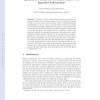40 search results - page 2 / 8 » Concurrent Games and Full Completeness |
AAAI
2011
12 years 4 months ago
2011
Recently the general Game Description Language (GDL) has been extended so as to cover arbitrary games with incomplete/imperfect information. Learningāwithout human interventionā...
TLCA
2009
Springer
13 years 11 months ago
2009
Springer
GĀØodelās completeness theorem is concerned with provability, while Girardās theorem in ludics (as well as full completeness theorems in game semantics) are concerned with proo...
FSTTCS
2005
Springer
13 years 10 months ago
2005
Springer
Much recent research has focused on the applications of games with Ļ-regular objectives in the control and veriļ¬cation of reactive systems. However, many of the game-based model...
ICALP
2009
Springer
13 years 11 months ago
2009
Springer
Abstract. We study a model of games that combines concurrency, imperfect information and stochastic aspects. Those are ļ¬nite states games in which, at each round, the two players...
CASES
2005
ACM
13 years 6 months ago
2005
ACM
The concurrent synchronous language Esterel allows proto treat reactive systems in an abstract, concise manner. An Esterel program is typically ļ¬rst translated into other, non-s...


